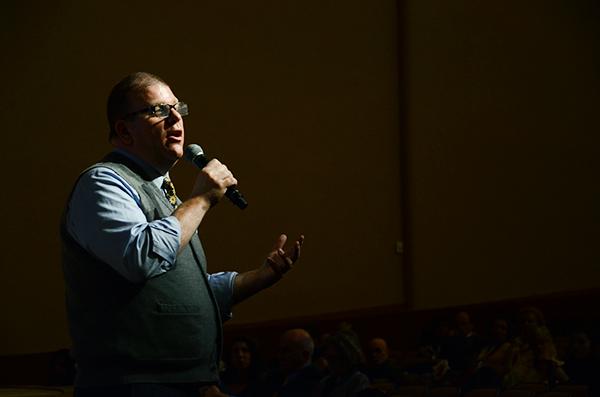
Administrators defended GW’s counseling services Friday after the parents of newly admitted students used the bulk of an hour-long information session to ask about the recent string of suicides on campus.
The academics and student life-focused presentation, which brought hundreds of families to Lisner Auditorium, drew questions from a handful of parents about the quality of campus mental health resources.
Two students committed suicide this semester and another student died from an unconfirmed cause. A fourth student was killed in a car accident off campus.
Forrest Maltzman, a top academic administrator at GW who led the event, told parents he believed the counseling center’s services were strong and that top officials often evaluate the program’s effectiveness.
“I cannot promise you that these sorts of tragedies will never occur on campus because they probably occur on a number of campuses, throughout high schools and all sorts of places in America,” Maltzman said. “But I think we’re doing a pretty good job in spite of the several instances that you’re referring to.”
Parents also asked about alcohol policies, campus security and freshman orientation programs – but the majority of the event’s Q&A centered on counseling.
University Counseling Center director Silvio Weisner, who attended the panel because GW had anticipated questions from parents, listed the center’s hours, call-in services and policies. He also explained that it had extended services on the Foggy Bottom and Mount Vernon campuses and will soon add permanent counseling services to the Vern, where two students died this semester of apparent suicides.
“The community is struggling, but we are banding together,” Weisner said. “The University is currently working hard to make sure the students who are here in the community are getting the emotional support that they need to be able to grieve and to heal and to move forward.”
Weisner said he attended the panel and joined families at breakfast and lunch during the admissions visit because he anticipated parents would want information about mental health services.
He and Maltzman touted the CARE Network, a referral system launched two years ago to act as a safety net for students. Last year, about 275 students had been reported through the system, but dozens of professors surveyed by The Hatchet last year said they had little or no knowledge of the program. GW declined to provide updated numbers this year.
“One of the things that we’re trying to do is make sure that there are as many tools as possible for people to raise red flags,” Maltzman said.
Several parents asked whether the students who died, Sean Keefer, Benjamin Asma and Lynley Redwood, had used counseling services. Weisner said confidentiality laws prevented GW from sharing that information.
The administrators urged parents to talk to their students about GW’s physical and mental health resources, adding that the counseling center encourages students to sign waivers so counselors can share information with their parents.
“Sometimes that takes a parent’s help to go ahead and encourage their sons or daughters to get the help they need,” Maltzman said.
Several parents said after the session that the conversation dwelled on the tragedies for too long when they hoped to hear more about academics, residential life and freshman transition programs.
Henry Connors, a father who knew about the deaths before visiting campus Friday, said he hoped there would be “serious time” spent at Colonial Inauguration addressing mental health resources. But he also said he wanted to know more about how GW reaches out to students who show signs of distress.
“What immediately struck me was they seemed to put a little bit more responsibility on students seeking the help as opposed to vice versa,” Connors said. “Very often, I think there may be signals that unfortunately get missed in any mental health situation – not just in the schools but in the general populace.”








